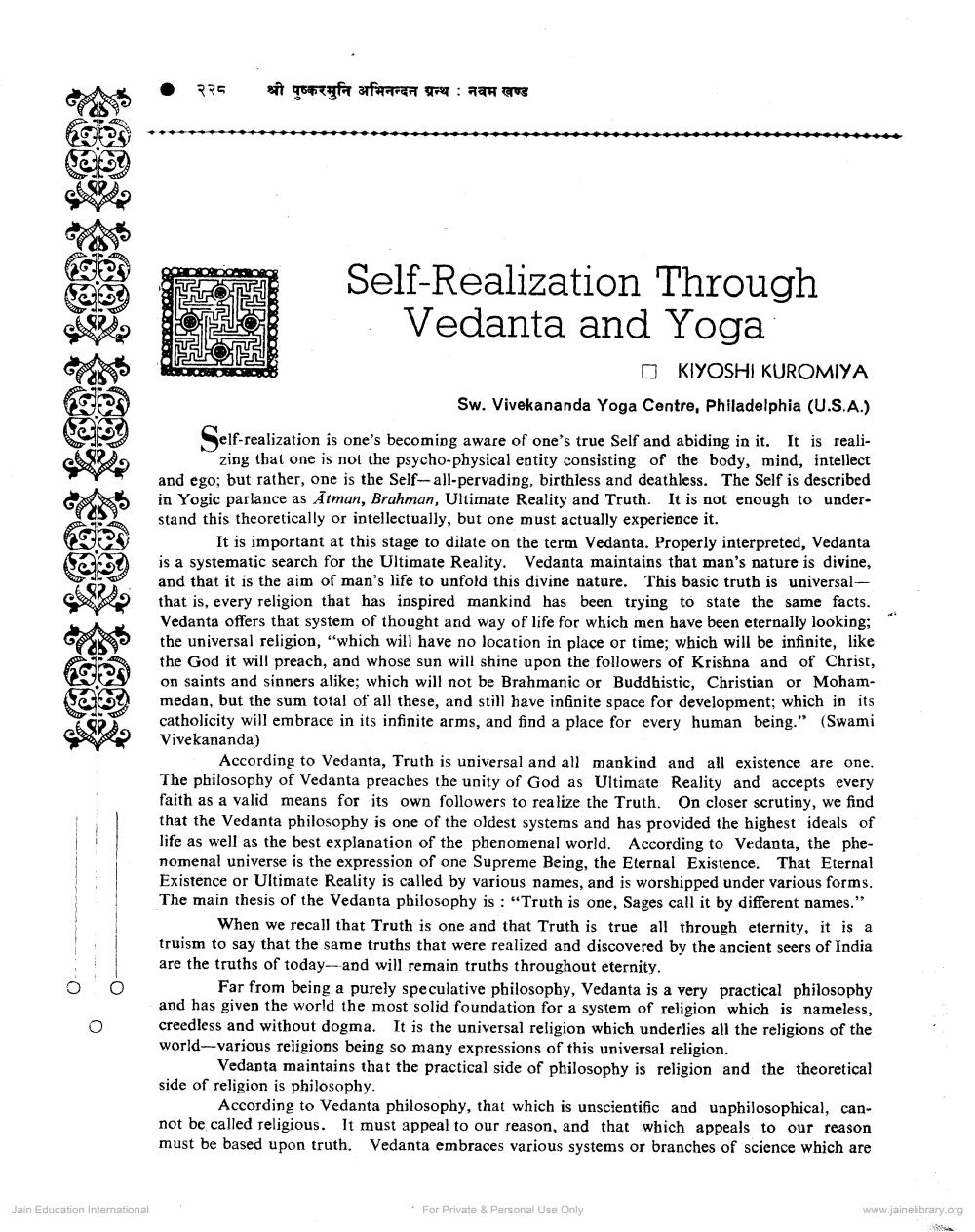Book Title: Self Relization through Vedant and Yoga Author(s): Kiyoshi Kuromiya Publisher: Z_Pushkarmuni_Abhinandan_Granth_012012.pdf View full book textPage 1
________________ २२८ श्री पुष्करमुनि अभिनन्दन ग्रन्थ : नवम खण्ड 0:00:DOMORO Afro Self-Realization Through Vedanta and Yoga nel O KIYOSHI KUROMIYA Sw. Vivekananda Yoga Centre, Philadelphia (U.S.A.) Self-realization is one's becoming aware of one's true Self and abiding in it. It is reali zing that one is not the psycho-physical entity consisting of the body, mind, intellect and ego; but rather, one is the Self--all-pervading, birthless and deathless. The Self is described in Yogic parlance as Ātman, Brahman, Ultimate Reality and Truth. It is not enough to understand this theoretically or intellectually, but one must actually experience it. It is important at this stage to dilate on the term Vedanta. Properly interpreted, Vedanta is a systematic search for the Ultimate Reality. Vedanta maintains that man's nature is divine, and that it is the aim of man's life to unfold this divine nature. This basic truth is universalthat is, every religion that has inspired mankind has been trying to state the same facts. Vedanta offers that system of thought and way of life for which men have been eternally looking; the universal religion, "which will have no location in place or time; which will be infinite, like the God it will preach, and whose sun will shine upon the followers of Krishna and of Christ, on saints and sinners alike; which will not be Brahmanic or Buddhistic, Christian or Mohammedan, but the sum total of all these, and still have infinite space for development; which in its catholicity will embrace in its infinite arms, and find a place for every human being." (Swami Vivekananda) According to Vedanta, Truth is universal and all mankind and all existence are one. The philosophy of Vedanta preaches the unity of God as Ultimate Reality and accepts every faith as a valid means for its own followers to realize the Truth. On closer scrutiny, we find that the Vedanta philosophy is one of the oldest systems and has provided the highest ideals of life as well as the best explanation of the phenomenal world. According to Vedanta, the phenomenal universe is the expression of one Supreme Being, the Eternal Existence. That Eternal Existence or Ultimate Reality is called by various names, and is worshipped under various forms. The main thesis of the Vedanta philosophy is : "Truth is one, Sages call it by different names." When we recall that Truth is one and that Truth is true all through eternity, it is a truism to say that the same truths that were realized and discovered by the ancient seers of India are the truths of today and will remain truths throughout eternity. Far from being a purely speculative philosophy, Vedanta is a very practical philosophy and has given the world the most solid foundation for a system of religion which is nameless, creedless and without dogma. It is the universal religion which underlies all the religions of the world--various religions being so many expressions of this universal religion. Vedanta maintains that the practical side of philosophy is religion and the theoretical side of religion is philosophy. According to Vedanta philosophy, that which is unscientific and unphilosophical, cannot be called religious. It must appeal to our reason, and that which appeals to our reason must be based upon truth. Vedanta embraces various systems or branches of science which are Jain Education International For Private & Personal Use Only www.jainelibrary.orgPage Navigation
1 2 3 4
